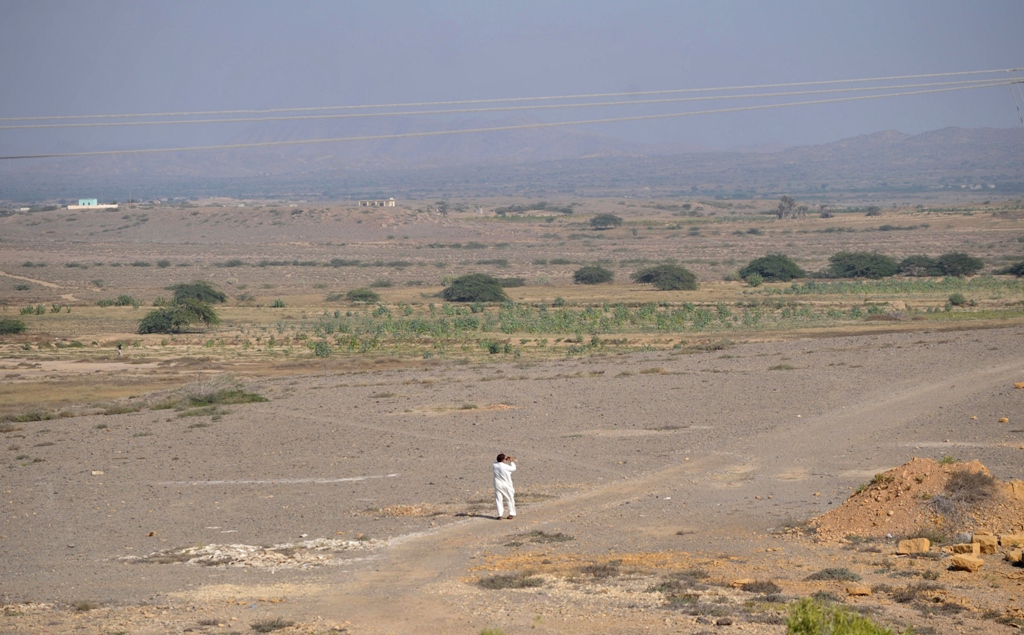
Regarded as the dirtiest of all fossil fuels, recent discoveries of untapped coal fields in the south of Pakistan have convinced the government they could be on the cusp of a solution to their energy woes.
Late last month, Prime Minister Nawaz Sharif and his former rival, ex-president Asif Ali Zardari jointly inaugurated the construction of a $1.6 billion coal plant the southern town of Thar, hailing their shared goal of ending the nation's power crisis.
The government has also green-lighted the construction of a pilot 660 megawatt coal-fired plant in Gadani, a small, serene town on the Arabian Sea known as the country’s ship-breaking hub.
A 600 megawatt plant has also been given the go-ahead in the city of Jamshoro.
The construction of these plants is one plank in an ambitious plan to convert many of the country's existing oil-based thermal plants and upgrade its ports as they begin swapping one black gold for another.
"This is a major and historic fuel switching plan as we generate zero from coal compared to India which generates 69 percent of its electricity from coal-fired power plants," Minister for Water and Power Khawaja Asif told AFP.
Pakistan has struggled with scheduled power cuts for decades. But the problems have been particularly acute since 2008, with regular outages of up to 22 hours a day for many domestic users and even longer for industries - costing about two percent of GDP per year.
In the hot summer, when temperatures soar to 50C in the country's centre, the country produces around 18,000 MW of power, with an average deficit of 4,000 MW.
A lack of capacity together with huge debt cycles exacerbated by poor rates of tax collection are seen as some of the major factors contributing to the country's dismal power shortages.
The issue was also a central campaign theme in last year's general elections, which saw Nawaz Sharif elected to the top post.
Faced with a growing bill for imported oil that currently stands at $14 billion and a rapidly depleting supply of natural gas, the country's private and public plants are switching their oil-plants over to coal.
"Pakistan has been facing rising oil prices and declining gas reserves as well as tight foreign account situation, rendering the reliance on the import of oil to fuel power plants increasingly unaffordable," the Asian Development Bank said in a statement.
Pakistan's largest private sector power utility Karachi Electric Supply Company (KESC), which provides electricity to the country's biggest city, has taken the lead in plans for the coal switch.
The company has recently granted engineering, procurement and construction contracts to Chinese company Harbin Electric International to convert two units of the Bin Qasim thermal power stations with 420 megawatt capacity.
The $400 million project is expected to be completed by 2016.
Alongside the conversions, Pakistan is also upgrading its port facilities to increase its ability to import coal.
"Ports are the lifeline of the country," says Haleem Siddiqui, a veteran seaman who pioneered the first state-of-the art container terminal at Karachi Port and whose company is building a "dirty cargo terminal" at Port Qasim along Arabian Sea.
The fully-mechanised terminal would be able to handle four to eight million tons of coal in the first phase to be completed by 2015, growing to 20 million tons in the extended phase in 2020, at a cost of $200 million.
But merely raising the amount of imported coal would strain the country's already dwindling foreign exchange reserves and adverse balance of payment, which fell to 13-year low of $2.8 billion in February.
Which is why Pakistan is determined to find some of its energy needs under its own soil.
Some experts have pointed to the Thar Desert in Sindh, which sits on top a vast potential source of 175 billion tons of coal.
"It is very huge reserve and is equivalent to combined oil reserves of Iran and Saudi Arab in terms of heating value," Agha Wasif, chief of the provincial energy department told AFP.
Engro Powergen Limited, a joint venture of public and private sectors, is developing a block of the Thar coal field with $800 million dollars investment which is set to open by 2016.
But not everyone is pleased. Some residents inside the Gadani Energy Park have been forced to leave their homes.
"We are living here for seven generations and we have the graves of our ancestors here, how could we leave our place?" said 25-year-old Umaid Ali from the village of Qadir Goth.
The power minister said no widespread displacements would take place, saying the land purchased for the Energy Park had been purchased long ago "and if there is any (residential) disturbance that would be duly taken care of".
Pervez Hoodbhoy, a nuclear scientist and energy commentator, said that despite its dirty reputation - coal produced 44 percent of global C02 emissions in 2011 - Pakistan has few other options to keep the lights on.
"I'm aware of the fact that there are serious CO2 issues but the amount Pakistan is producing would be insignificant on the global scale.
"The alternative is nuclear power plants being imported from China and those have the potential for disaster given Pakistan's safety record. Given the choice this seems to be the lesser of two evils," he said.
COMMENTS (28)
Comments are moderated and generally will be posted if they are on-topic and not abusive.
For more information, please see our Comments FAQ




1732538123-0/BeFunky-collage-(90)1732538123-0-165x106.webp)

1732530440-5/Copy-of-Untitled-(85)1732530440-5-270x192.webp)



1732534225-0/Express-Tribune-(13)1732534225-0-270x192.webp)






I will advise a very basic solution to this Problem. Please keep your human population in control. Population is always ahead of the RESOURCES (Natural and financial) we have. Soon we will run out of coal and your country will be covered with carcinogenic black layer due to coal burning.
I remember reading the same headline 5 years ago
@Akram Durrani:
You are right coal is dirtiest. However your argument that is is banned is not true. Many developed and developing countries use it extensively. It is lesser of the two evils.
Here are some numbers of carbon emissions to compare. Even if Pakistan produces 100% electricity with coal our share in global emissions would be negligible.
MMTCO2e Billion m3
China 135.7 USA 55.3 Ukraine 26.3 Russia 26.2 Australia 21.8 India 19.5 Pakistan 0.95
@Robert:
So what does Pakistan do with the spent fuel? What plans and what money is appropriated to decommission these nuclear reactors when they reach their end of life? The reality is that Pakistan doesn't have the basic infrastructure, knowledge, or financial ability to properly manage nuclear power yet many spout the same nuke mantra that has been proven wrong decades ago. Nuke power isn't cheap, safe, or necessarily better - especially when applied to third World countries.
Coal is hazardous to environment more than other energy sources; many countries in the world have banned the energy production through coal. As the amount of hydrogen omitted by the reactors is the major cause of global warming, even to control the hydrogen or making a useful use of it. Hydrogen plants are constructed for further production of energy sources but that project will cost more. Pakistan with the fragile economy cannot afford coal power production and environmental activists will get a chance to point fingers over Pakistan’s policies.
Pakistan is lacking in the investment and funding, with this economy to meet the energy needs it should concentrate on one energy source. PAEC has already been given a target of achieving 40,000MW till 2050. Pakistan will need lot of funding on setting up proper nuclear program, with working nuclear plants. Pakistan also needs to build fissile material storage facility and maintenance cost. Policy makers have to be more responsible in setting the goals for utilizing the national assets.
as far as dirty argument is concern, remember, environment is not the main issue it is the economy and basic necessities of life. Look at Canada with all the oil sands and the environmental impact, the Govt in Canada has no problem promoting and actually defends itself by saying oilsands is not dirty but the oil coming from Iran and Russia and Saudi is. Because that oil and not Canadian oil is funding these non democratic and corrupt regimes. for instance, russia depends on oil to keep its GDP in black!
Nuclear power is a mostly clean way of getting energy, and the materials used are very efficient when getting energy. There are problems, like nuclear waste and natural disasters, but as we advance technology, we will work around those problems. I feel like we should continue as we are going right now
Nuclear Power is best I think we should continue to use nuclear power because it is much cleaner, it causes much less deaths AND prevents more deaths than fossil fuels. if we keep on using fossil fuels until they are used up, there will be eve more global warming and many more deaths. You can't always use wind or water power because sometimes there isn't enough wind or water, and solar panels are too expensive.
Coal is cheaper and dirtier than oil but you still have to pay for it - and that's the real "shortage" in Pakistan.
These Coal Fields need to be mined right? India can extend a helping hand by sending some trucks and all that.However, the profit needs to be split 50:50.The Coal fields are a good source of energy that India and Pakistan could exploit together.
@usman786: In the long run hydel is definitely cheaper 1-2 Rupees cost per unit. Cost to construct is 2.5 times however. But there are second and third order of effects. Reduction of flooding and more irrigation, these are part of that 2.5 times cost. If Dalmer and one other dam was built ahead of Tarbela the MW increase would be around 8,000MW an hour, plus the water storage would allow Tarbela to produce at 100% year round without losing water. The cost of fuel (running through the three hydel power plants) is free once the cost to construct is paid for (approx. 12 years). Maintenance on a Hydel plant is nil (1-2 Rupees per unit cost) whereas gas AND coal fired plants require major overhauls every 8-10 years and are subject to the cost of fuel. The education for the people of Pakistan is out there if they really want it. The forces that are saying lack of payment of tariffs and circular debt are the problem are fooling everyone and they are the ones that are actually stealing around $10-20 million a month. Proof.... when the circular debt was paid down last fall how fast did it start re-accumulating?? It is theft that is being described as and hidden by circular debt and also hidden by foreign aid.
Build wind turbines. Wind turbines do not need to be mounted on any column any more now. The new way is to keep the turbines on the ground level and build such structure either in metal or concrete which will be as high as it can be built which will suck wind from high level to be funnelled to ground level to feed into proper turbines at horizontal level which should drive electric generators. Such structure in the form of funnel around a wind sucking structure should be able to draw wind from any direction.
It is a very good news. If Pakistan gets non stop electriciyt, our industries will do the rest! Even in these circumstances, we have acheived our export target.
The problem is u change ur goals every 3 months.
@ Anoni " Same news repeated over and over again .... Once they do something then it’s news. ET " Well they are repeating this news again because they are going for a miracle " Once the coal is extracted both the thugs will equally share by exporting to beloved India "
@Kashif: Provinces were empowered without given sovereign guarantees until now so stop blaming Punjab government as a target practice. Punjab gov have its own policy of production of electricity based on coal and they are on the right track with its implementation phase due to be completed before 2016.
https://www.facebook.com/photo.php?v=685365948168681
It takes four years to start a 660 MW coal power plant. 2500 Cr. Indian rupees. 10 such plants and Pakistan will have 24x7 power.
very good news, thanks God now we can be free from the slavery of narcissistic so-called brotherly countries like iran who sell us nat gas for 14 dollars mmbtu when it is only 4 dollars in US of A.
Another load of nonsense to cover the deliberate wrong policy decisions of all the past governments that placed SELF before the nation.
Shahbaz Shareef: If load sheeding is not resolved in 9 months change my name
Nawaz Shareef: Please ignore Shabaz comments he gets carried away while addressing public
Poor Public: Finally the load-sheeding is now resolved, before PMLN govt, power came only for 8 hours a day and now it comes for a full 10 hours a day. "Just 14 hours load-sheeding a day. Great achievement"
Wow, this Government experience, mature leadership has resolved our all issues.
Better late than never, converting from oil based power plants to coal should have come 5-6 years before but still it would benefit Pakistan in longer run. A nation cannot gain anything without Power an Energy.
Provinces had been empowered 5 years ago to produce their own electricity. If PML N was any sincere with this country, they would have gone for some investment in such projects in Punjab at the least ! But they were more interested in getting quick medallions like metro bus and sasti roti scams just to please their halka biradars. On a lighter note, such projects will never become a reality because our government's main revenue comes from the sale of oil and related taxes; otherwise they would have gone to produce electricity on war footings.
Most of Thars coal is lignite, its is great for DOMESTIC power generation in PAK. A quarter of Germanys total electricity comes from lignite/brown coal.
why donot they go for hydral first which is far cheaper? is there no commission in that?
Same news repeated over and over again ..
Once they do something then it's news. ET